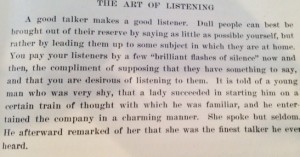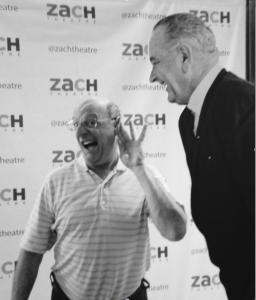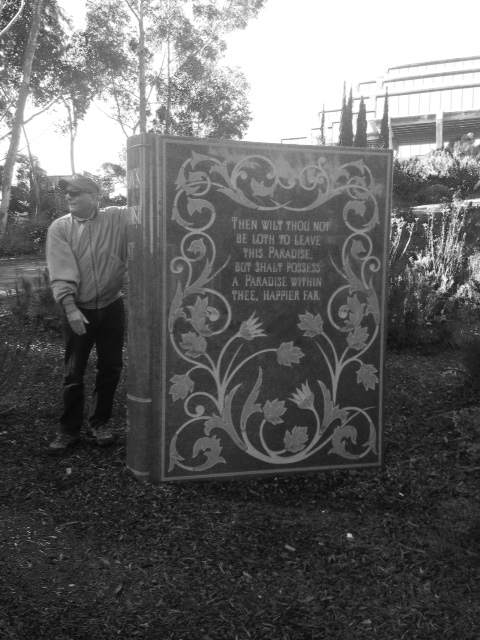PoSt MoDeRn CoNvERsaTiOnS
WHAT WE TALK ABOUT WHEN WE TALK ABOUT WHAT WE TALK ABOUT LIKE WE NEVER TALKED ABOUT IT BEFORE

My compliments to the ocean.
Dick Cavett in a restaurant after being served a nice piece of fish.
A good folk journalist makes for a good emcee. Like Mr. Cavett, bringing the table together. A Master of Ceremonies. Bring on the Fun Conversations. That’s me!
How does one speak MC ?
Here’s one thing to try: Offer remarks that bring the most amount of people together at one time:
“Well, it looks like introductions are in order!”
“Did you make that yourself?”
“What’s your sign?” (Mine is Slippery When Wet. Thanks to Wavy Gravy for this.)

So are you ready to emcee yourself?
[See QUICK OPENERS, DECEMBER 7 2015 for Paul Sills’ advice: “Encourage the laggards.”]
Expert Catherine Blythe suggests in her book The Art of Conversation aiming for about four minutes before cutoff. No longer than that. Keep that convo moving, “like a good game of Frisbee.” Otherwise, she says, it becomes boring — I mean, people and their freakin’ monologues, right?
http://www.amazon.com/The-Art-Conversation-Neglected-Pleasure/dp/1592404979
Q: What is having to listen to somebody talk for fifty minutes and not getting paid?
A: The opposite of therapy!
How does a folk journalist avoid that happening?
A lot of people get into conversations just to let you know who they are. They have no interest in you. (Hard to believe, right?) So why bother listening to them playing the same tape made-to-impress? And how to get an edge in word-wise and actually have conversations with people who talk a lot?
Folk journalists know that wrangling the ego of such a talker takes semi-masterful talk techniqueing. So here’s how to enjoy listening to them, even as they go on and on ad infinitum.
The growing field of Ethnomonology* is here. Finally!
Taught online usually, for profit, and soon to be a major growth industry, ETM teaches that humanity’s monologues may actually teach us about said person rattling saying along. There’s the guy who narrates his lives as he goes through it. Often you see him with ear buds and a phone, describing what corner he’s approaching (BEING HERE THEN!). He often uses Elmore Leonard’s “marijuana tense”** which author Martin Amis describes as dialogue using a present participle that creates a hazy sort of meandering now: “Bobby saying,” and then the dialogue follows.
If this seems difficult to handle, don’t despair. Think this is hard — try living in Papua, New Guinea; at least one tribe there speaks in 17 different tenses.
Languages of Papua: http://www.ethnologue.com/country/PG/languages

“You get my drift?”
– I’m following your smoke.
Still however, you may find yourself learning very little by listening. Nothing, maybe?
When walking with such individually-linked to themselves lingua leaders, remember this: Out amongst his own self, desiring nothing more than to be marveled at/gazed upon, heard in all his incredible incrudibleness, which he believes after all to be the next evolutionary stage of a human being — doubtful: By observing you may still pick up a lot of visual information to enjoy and/or play with.
Or as Yogi Bear once put it: Heyyy Boo Boo, from this viewpoint we can get a better outlook! (Or was that Yogi Berra?)
But if all your emcee attempts fail, chalk it up to what Holden Caulfield describes as, referring to conversations, “Goddam boring ones.” In Catcher In The Rye, he gets involved in more than two dozen confabs. But don’t worry, some of them he finds, “slightly intellectual.” ***
Finally, if still in doubt, you can blame it on The System, referring yourself to this Firesign Theater video:
Confidence in The System https://www.youtube.com/watch?v=VDqk8o6y13Y&feature=kp]
Enjoy!
* Invented for entertainment purposes only.
** Elmore Leonard’s “marijuana tense” http://austinkleon.com/2005/12/22/elmo-leonards-present-participle/
*** J.D. Salinger’s The Catcher In The Rye is terrific for lovers of conversation: http://mentalfloss.com/article/64836/13-things-you-might-not-know-about-catcher-rye

